Elderberry Vinegar Recipe
Related pages:
- Elder – Identification, distribution, edibility
- Seasonal notes on elderflowers
- Elderflower champagne recipe
- wild food recipes
No matter how hard I try when serving my wild food tasting menus, this elderberry vinegar always steals the show when served as a simple wild salad dressing. It is fruity, thick and very sweet, with a depth of flavour that puts it on a par with, if not beyond, the very finest balsamic vinegars. It actually got a “wow” from the team at Andrew Fairlie’s restaurant at Gleneagles when we had a cook-in in the Perthshire hills, and I’ve passed the recipe on to countless others since.
Even better than that, elderberry has long been thought to have immune-modulating and antioxidant effects and is traditionally used in the treatment of viral infections. There are no “miracle cures” out there, but the sort of biodiverse eating of a wide range of plants, fruit, seaweed and fungi certainly gives you the best chance of staying well. I’ve listed and provided links to more “everyday weeds” that can help support a healthy immune system here.
How does this relate to your delicious elderberry vinegar? Well I make a point of imbibing some at least every other day through the winter, whether by the spoonful, diluted with hot water as a drink, as a salad dressing, to enrich a tomato sauce, or as the fruity base for a sweet and sour style stir-fry – any way you like should help you to stay well as part of a biodiverse diet.
I haven’t had a cold or virus for over 5 years, and I attribute this predominantly to regular use of elderberries and medicinal mushrooms, as part of a biodiverse diet.
This preparation is technically a “shrub”, in this context meaning a liquid mixture of sweet and tart or a “drinking vinegar”. The name comes from the Arabic shurb, meaning drink, and sharbat, a Hindi word for an aromatic syrup made from fruit or herb and flower extracts. Shrubs are all the rage in cocktail circles, and I often use them to balance sweet and sour elements in wild cocktails. Read more about this here.
Not that i’m taking any credit at all for the recipe. I’ve adapted it from Miles Irving’s excellent “Forager’s Handbook” (if you haven’t bought it yet, you should) and Miles attributes it to forager-herbalist Mandy Oliver. The recipe is essentially a sweeter, simplified version of the traditional old English elderberry/vinegar sauce called pontack. Allspice, nutmeg and black pepper are traditionally used to add an aromatic twist to pontack, but i’ve also had great success using wild spices like wood avens, magnolia petals and the seeds of several members of the carrot family .
But the simplicity of this unspiced recipe appeals to me and it is a modern classic. By all means explore spiced variations, but I recommend you start simple if making it for the first time.
This elderberry vinegar is the essential stock item in my larder – and I get quite twitchy around the end of September about having gathered sufficient berries to see me through the following year. Bear in mind that if you gorge on the elder buds and flowers during the summer, you will have less berries come autumn – careful resource management required! Read more about the all-round wonder-wild food resource that is the elder tree by clicking here.
I use this sweet elderberry vinegar as salad dressing, sauce enricher, marinade, to give depth to stews, like ketchup (my friend love it on roast potatoes), and even diluted with boiling water in my flask when in the mountains. It is so sweet, fruity and warming that its easy to forget that it is a vinegar – though I have had funny looks from Mountain Rescue colleagues when offering them a cup! Apart from the sugar, it is really good for you: high in flavanoids, anthocyanins and vitamins A and C.
This recipe also works well for other fruits such as blaeberries, blackcurrants and raspberries.
- Remove the elderberries from their umbels using a fork or place them in the freezer and remove the berries easily while they are still frozen. See my safety note below on how meticulous to be about removing the twiggy bits. I accumulate berries in my freezer in dribs and drabs throughout autumn then make a big batch. Frozen elder berries detach from their umbels more easily and cleanly.
- Weigh the berries before placing them in a suitable kilner or tub then
- Add 500ml of apple cider vinegar for every 350g of fruit. You can also use white wine vinegar, but I prefer to use apple cider vinegar that can be sourced more locally, and apples marry with elderberries really nicely.
- Leave covered for 5 days, stirring occasionally.
- Strain off the liquid, pressing the berries with the back of a label as you do, before discarding the spent berries.
- Add 350g of white(ish) sugar per 260ml of liquid. I use organic golden granulated sugar. You could certainly play about with darker, less refined sugars. I get asked a lot about reducing the sugar content to make a less sweet version. This is definitely an option and will work fine, but to me rather misses the point of this gloriously gooey concoction
- Simmer for 10 minutes then bottle.
Safety Notes:
- The final cooking stage is important: elder berries should not be consumed uncooked as they contain a cyanogenic glycoside called sambunigrin which can be harmful in high dosage. Cyanogenic glycosides are found in the seeds of numerous other fruits too, including apples and peaches, so we are at the “safe in appropriate dosage and with proper preparation” end of the spectrum of edibility here (most things we eat fall into that category!). Sambunigrin consist of a cyanide group bonded to a sugar; when the compound is digested, the cyanide group is freed from the sugar, and can exert toxic effects. Its hard to say what a safe dosage is, as it depends on the individual plant you are harvesting from (stage of growth, specific phytochemistry from its specific location etc) and the person consuming (age, personal biochemistry etc). Suffice to say that friend of mine who made raw elderberry smoothies for his whole family had spectacular purple vomit to clean up from 3 out of 4 of them! I have another friend who (against my advice) allows her kids to nibble a few raw elderberries here and there, with no ill effects. Fortunately sambunigrin is volatile, evaporating at around 27˚C, so boiling renders them perfectly safe.
- The leaves, stems and berries of elder can also contain other alkaloid compounds (notably sambucine) which are also poisonous. Twigs and foliage should be removed as far as practicable, but it would take a patient person to remove every last bit of super-fine twig that holds individual fruits to umbels. For all but the most OCD, a bit of twiggage is inevitable and not a big issue, as you will be both filtering them out, and then cooking the final infusion. Only you can decide what you are comfortable with, and how much time and effort you want to spend removing every tiny bit of twig!
The resulting sweet, unctuous vinegar will keep very well. I can’t say for how long because no matter how much I make, I always end up having to eek out the last little bit until the next year’s elderberries appear!
Here are some of the ways I have used elderberry vinegar in my Daily Wilds:
Sweet pickled herring on rye bread, wild garlic, lesser celandine, sea radish, elder vinegar. I love pickled herring and have eaten countless variations on this theme throughout the spring. It looks quite elaborate but takes less than 5 minutes to throw together – so long as your herring is already pickled! The elderberry vinegar tempers some of the more pungent leaves and unifies the whole dish.
I have’t found a salad yet that isn’t improved by elderberry vinegar. Here with pennywort, sea sandwort, garlic mustard and sea kale shoots, buds and flowers.
Roast teal with wood blewits, caramelized reedmace, elderberry sauce, sea beet and scurvy grass.
Elderberries go very well with game. I used the vinegar with wild juniper and thyme to marinade a haunch of venison for our christmas dinner.
Related pages:
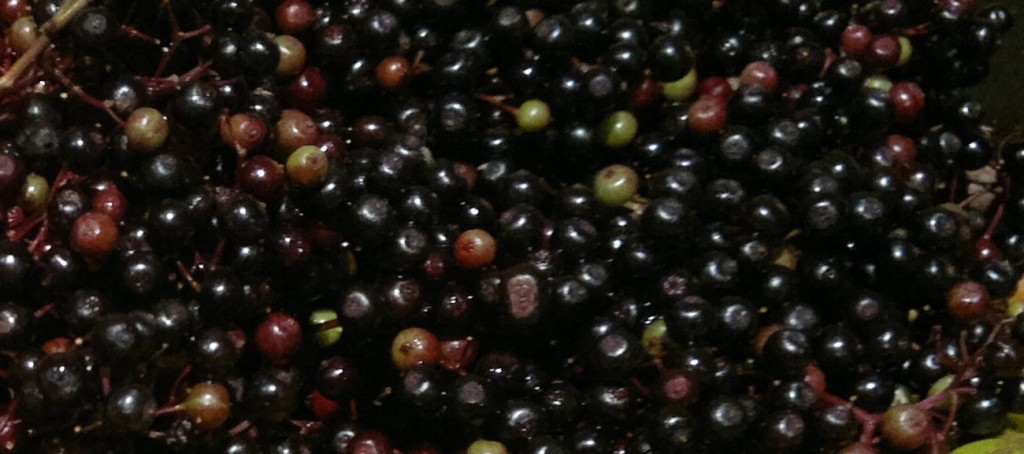
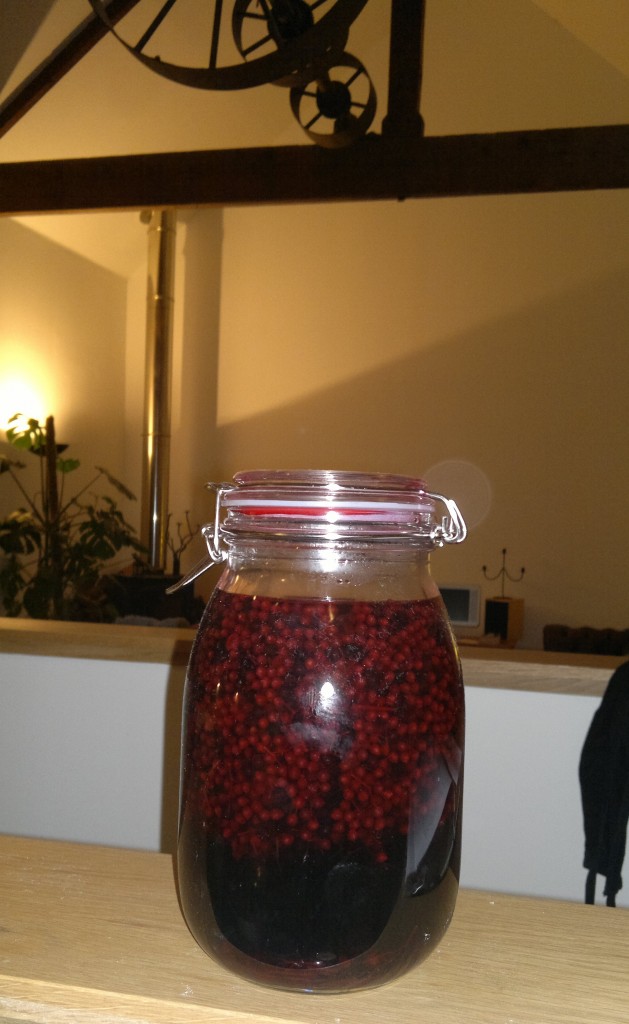
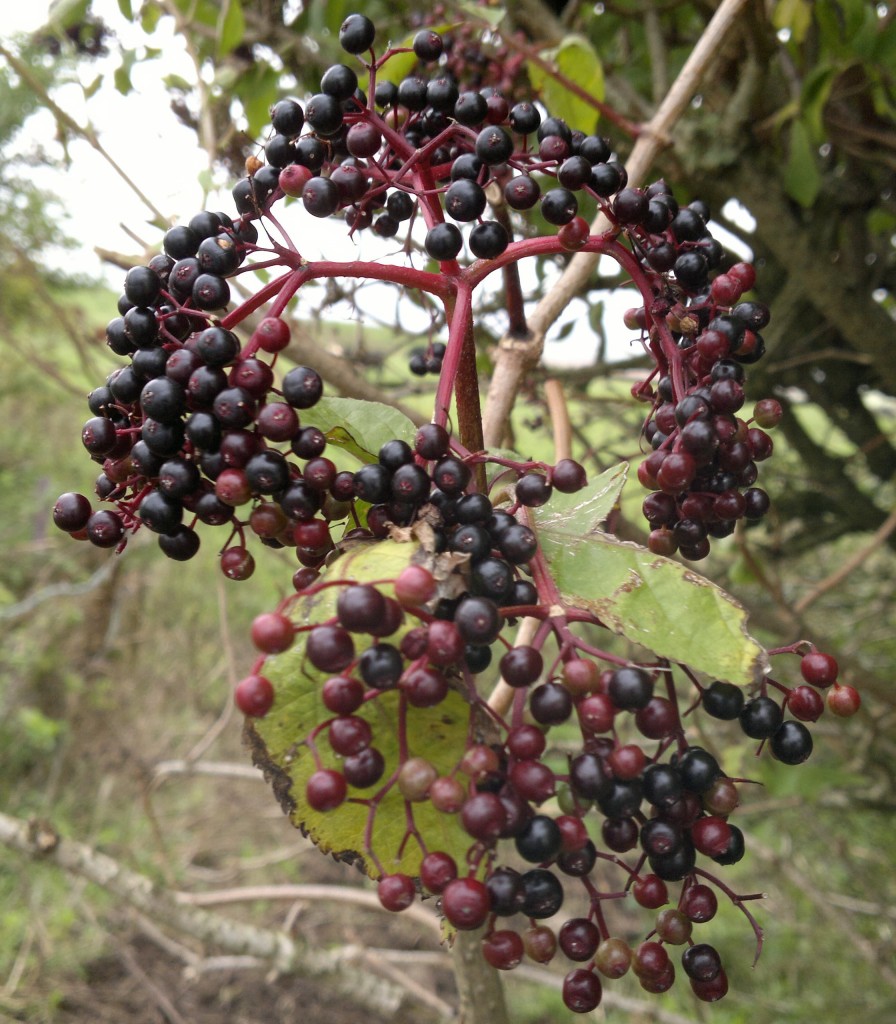
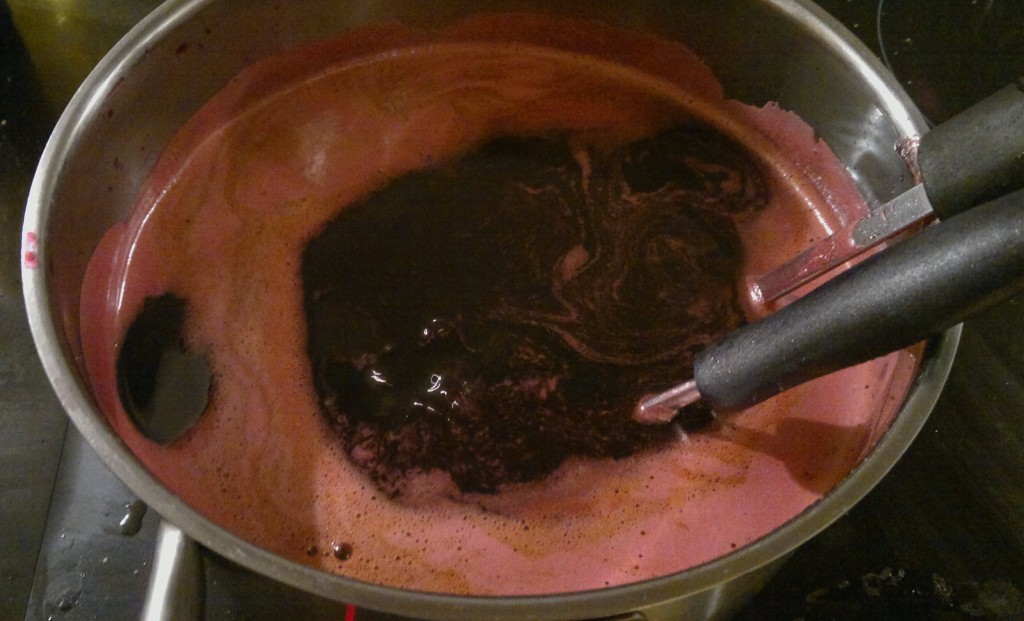
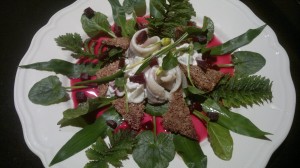
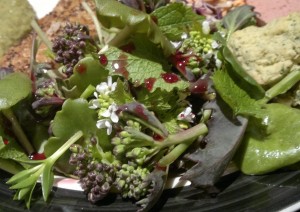
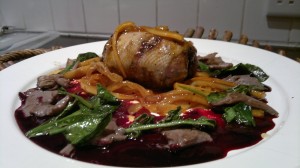
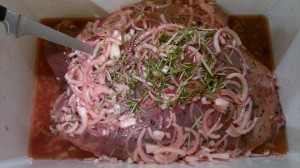
96 Comments
Looks great – any reason I can’t just throw the vinegar, sugar, and berries in the kilner jar together at the beginning? Wouldn’t it improve the extraction from the berries, a bit like the sugar in sloe gin? Also, is the boiling a reducing step, or is it effectively pasteurisation to improve keeping, or what? Sorry for the 20-questions! Great recipe, going to make some as soon as possible!
Hi Kate,
All sounds worth a go! The simmering is only for 10mins – so not really a reducing step. More to meld the 3 ingredients I think. Let me know if any experiments improve the recipe – though hard to imagine it tasting any better! Happy preserving,
Mark.
Isn’t is also necessary to boil the berries as I understand uncooked berries are mildly toxic/laxative..
You are correct, which is why the recipe includes simmering the liquid for 10 minutes. The precursors to hydrogen cyanide contained in elderberries are volatile and evaporate at around 27˚C, so this is more than sufficient.
I use light soft brown sugar, adds vaguely caramel tones to the flavour.
Must try this recipe. I have made Elderberry Cordial this year and for a few years have made Apple Cider Vinegar, also Apple Juice so understand the need to pasteurise for longevity and
steam off toxins so I am relaxed about drinking Elderberry Cordial. My wife and I enjoy the Cider Vinegar on salad and as a marinade for pork. I drink vinegar straight in a shot glass if the flavour is right! Looking forward to trying Elderberry Vinegar as a drink, dressing or marinade!
Thanks.
I have masse this recipe, it is probably the most delicious thing I’ve ever made! My family are besotted & I’ve had to make litres of it! I too drink it warm & diluted.amazing!
Great! Glad you like it. I use it most days and haven’t had a cold for ages!
Three years later and here I stand making another 8litres of the gorgeous stuff of life.
We love it.. And look forward to it being cooled so that we can test it…..!
Love this recipe! And I have the Miles Erving book and have missed it!! Can’t wait to give this recipe a try- I have been monitoring the elderberry bushes, and not long now! Thanks for sharing! Love the blog, I’ll keep reading! 🙂 Charlotte
I’m going to make this vinegar it sounds amazing. When straining off the liquid are you supposed to squash and press the elderberries to maximise flavour extraction? Have you ever made green elderberry capers? I’m intrigued to see what these taste like.
Hi Mike, Yes, a bit of squishing would help. I have never made green elderberry capers, intriguing though they sound, because I can’t help but see it as a waste of future berries for vinegar! There seem to be lots of other things available for capering…but please let me know if the green elderberries are outstanding and I will tweak my resource management!
Just a question really as I have not used your recipe yet. Can the elderberries be used in a no cook recipe I have to replace raspberries. Can the sugar also not be added. Thanks Ian
Hi Ian, I don’t know. Please experiment and let me know how it turns out. You may very well discover a new delight.
Love this from my childhood, 60 years ago, when we had the vinegar thick and warm, over Yorkshire pudding. A gorgeous desert!
Your elderberry vinegar was amazing with the smoked duck today – perfect match!
Hi Mark. I was always told not to eat raw elderberries in any quantity because they contain small amounts of cyanide, so it might be safer to stick to the simmering?
Hi Hilary,
Lots of things contain small amounts of cyanide – seldom enough to be dangerous – but yes, the best advice is to always cook elderberries. I certainly don’t eat them raw.
hi mark
I made this elderberry vinegar to your exact recipe and its fantastic I had a bottle left to one side to see how it matured over a year and the taste is amazing even better with age. do you think you could make this vinegar using yew berries with out the stone or is this just too extreme would the poison content be too much I’ve eaten a few yew berries and enjoyed the taste not sure about a vinegar or possibly a syrup
regards
chris
Hi Chris,
To the best of my knowledge, yew berries will be fine, provided you remove the seed. People may raise an eyebrow when you offer them yew syrup though…
Let me know how it turns out.
Cheers,
Mark.
Hi Mark
Geoff (my husband) tried a version where he didn’t steep the berries but immediately simmered in the vinegar with the sugar, then strained through a fine sieve, mashing the berries as he did so. It’s worked brilliantly, but it’s more like an extremely intense flavoured jelly rather than the syrup…
Could you do the same syrup with hawthorns or rowans?
Best wishes
Carri
Hi Carri,
Sounds great. There are loads of ways to capture flavour.
Haws and rowan berries don’t share the same juicy qualities, so may not be quite so interesting – but please do give it a go! Wild food is all about experimenting – let me know how it turns out. 🙂
Hi there,
What type of sugar do you recommend? I was thinking of a dark soft brown sugar?
Thanks,
Kate
Hi Kate,
I use organic unrefined golden granulated sugar. Dark brown could be really interesting. Let me know how it turns out.
Mark
Can you process the jars afterwards in a hot water bath for a longer shelf life? Thanks!
With all that sugar and vinegar, this keeps almost indefinitely without further processing. If you are worried about any syrup going off, just add a glug of vodka – vastly increases the shelf life.
Thanks for this great recipe…I’ve just made my first batch of elderberry vinegar and it’s lovely, really rich and fruity.
Re ‘is it ok to squash the pulp to get all the juice out’, years’ of experience of fruit vinegars and jellies has taught me that it will spoil the clarity and intensity of colour of the finished product, but the flavour will not be really compromised.
Off to pick some more tomorrow!
Hi, just started to soak my elderberries. Was wondering if you have tried the recipe using less sugar … I guess it would keep for a shorter period of time?
Hi Ruth,
Do try then let me know. The joy of this recipe is the sweet, almost balsamic quality. Less sweet vinegars can also be delicious, but in quite a different way.
This version keeps pretty much infinitely.
Cheers
Mark
Hi Ruth and Mark
I found my first batch made to Mark’s recipe a tad sweet for my pallate so I took a small bottle and diluted it 50/50 with some raw white wine vinegar and loved it. My next batch of 8Lts I made with the sugar weight halved and it turned out remarkably well, much more like a fine balsamic than a syrup. This was to suit me of course. I also made 2Lts each of strawberry and raspberry to Mark’s recipe for my kids and they absolutely can’t get enough of it. Thanks again for the recipe Mark.
Cheers
Kenneth
I have made this recipe 5 times now. When I made my first batch, I tasted it after adding half the amount of sugar called for. I am diabetic so try to watch my sugar consumption. I personally love this and can’t imagine wanting it any sweeter so I always make it now with half the sugar. Not sure about longevity as it never lasts long enough to test that out!
When you say ‘keep covered for 5 days’, do you mean out of the fridge? Just picked my first elderberries ever and can’t wait ti try this!
Hi Karoline,
No, it doesn’t have to be in the fridge.
Cheers
Mark
I’m fairly sure the cooking removes the vomit bit from raw elderberries. Am going to make up a nice big batch of this stuff. Maybe fling a few hogweed seeds in. 😉 . Green elderberries are one of my favourite capers. Tiny and a little crunchy too. So many elderberries about one could go mad.
Ever tried it with balsamic?
No. As it already comes out like balsamic, that could be ridiculously tasty! I have some birch syrup balsamic which is pretty damn good!
I too will have some of that syrup. Very generous mouse. 😉
I am out of fresh Elderberries but have some dried. Can I use them? Will it taste the same? Would I have to do anything different?
Hi Sandra, I don’t know, never tried. I suspect it would be quite different, but maybe worth a go. I freeze all the elderberries I don’t use fresh. In fact most soft fruit.
I have made a batch using dried elderberries and found that I had to add additional vinegar as the berries soaked it up. Ultimately turned out just as good as using frozen berries!
Did the dried Elderberries, and it turned out great. I used only 1/2 the amount of berries. Will have to try to get some fresh berries and see if they taste the same. Followed your directions except for the berries. Thank you for the recipe.
Hi Mark, what a beautiful recipe. I picked my elderberries last weekend and have just finished bottling the vinegar…..one spoon for me, one spoon for the bottle, one spoon for me, one spoon for the bottle! Something tells me I need to go and get more elderberries to make another 5 batches! 🙂
Ha, lovely! So glad you are enjoying it. You’ve reminded me to go hit my elderberry patches – thanks!
Mark.
Last yearwe were on holiday and I missed the best of the elderberries so I used your recipe and substituted sloe berries. My husband says it tastes amazing but it has become so thick that we can’t get it out of the bottles. Any suggestions please.
Try heating the bottles in a water bath or microwave. Should make it more runny. Once you’ve got it out, dilute with vinegar and/or water, rebottle.
I am getting ready for my elderberry harvest later this month and I am currently making apple cider vinegar with an early apple crop. I love the idea of this recipe, but I am hoping to adapt it for raw honey. Could I boil just the elderberries and vinegar after letting them steep together, and add the sweetener (honey) after it’s cooled a bit? Or is it essential for the mixture to boil together with the sugar? Thanks!
Hi Anna, Sounds great. I’m sure this would work. The technical name for a shrub (sweet drinking vinegar) that is sweetened with honey is “oxymel” – try googling that for tips.
Have you ever tried it using cider vinegar instead of white wine…is the taste too strong?
Yes – works great. Possibly even nicer, and can be sourced locally.
Hi!
So incredibly excited to give this a try! picked my berries this evening and ready to go, one quick question though, do you cover (use the lid) on your kilner or do you just cover with a cloth to let it breath a bit? I did review the other comments and could not locate this…
Thanks!
Shannon
I put a lid on the container
Wow. Made this today. It’s absolutely gorgeous and delicious and lovely. I’ve added another load of vinegar to the berries to see if I can make a second pressing do to speak. Fingers crossed.
Just finished making the first of my 2018 batch. This is now the third year that I have made it and wouldn’t be without it especially for a hot drink for those with colds and sore throats. Just warn novices that you haven’t handed them a mug of Ribena, or, if you are feeling mischievous, don’t tell them and watch their faces when the vinegar hits them! Haven’t had anyone who, after the initial surprise, hasn’t t thought it was brilliant.
Hi I steam extract the juice from the berries.
Then I have elderberry juice. I want to know how to make flavored vinegar with the elderberry juice.
THANK YOU
Damn I adore elderberries, was meaning to get around to making cordial with them this year but left it too late; I’ll have to try this vinegar as soon as it’s time next year. God-willing.
Hi Mark great website. I have made elderberry vinegar several times and love it have you ever aged it a wooden barrel. I’m thinking this would enhance the flavour
Hi Mark. I’ve just made this vinegar. Simmered for about 15mins but it never became unctous? Just a tiny bit thicker than the original vinegar. Drank some with hot water, lovely & warming. Should I return to pan & boil until the consistancy becomes more unctous? Thanks. Fay
Hi Fay, I guess you could, but if you are happy with how it tastes, then why bother?
Hi ,
I am in the Sierra Nevada in Northern California. I use a juice extractor to get my elderberry juice after freezing the berry’s to pop them off the stems. I started making elderberry balsamic vinegar last year after making honey elderberry sauce for health and jelly for years. I need direction , I thought for the flavored vinegar you ad 3 cups organic apple cider vinegar to one cup Elderberry juice then let it sit in the dark for 10 days. Then cook down with brown sugar to get a syrup. Thank you for any help ..Also is there a secret to growing the Elderberry ?
I harvest Wild but have tried to grow them , no success there yet.
I look forward to coming out that way to visit someday.
I have not found the recipe from last year but it was awesome. Mary
Hi Mary, I’m sure your juice technique would work fine. I’m a forager, not a gardener, but i’m told that elder is very easy to propagate just by planting viable twigs.
Best wishes,
Mark.
Hi. Just wondering if you ever use the elderberries that you strain of for anything – perhaps chutney? Or do you think all the goodness has gone out from them? And other recipes I’ve seen suggest leaving elderberries to soak for 5-6 weeks. This year I haven’t found the time till now to do the cooking so they’ve been sitting in vinegar for 10 weeks or more. Flavour seems fine but do you think there’s any problem with leaving it so long?
Hi Kate, Provided you heat the vinegar to evaporate the cyanogenic glycosides, there should be no issue with safety. Flavour may be impaired a little, as long steeping can start to break down cell walls, leading to more vegetal notes, though this is usually more of an issue with alcohol extraction (tinctures). I personally find the post-steeping elderberries to be quite well spent, but no harm in trying to get more out of them – provided you heat whatever you make before consumption. Mark.
I have just finished making my first ever elderberry vinegar using your recipe. The most delicious taste ever! Thank you.
Hi Mark! Greetings from Poland 🙂 I have been making the elderberry balsamic vinegar using your recipe for five years now and am always returning to your original text and always read it with such pleasure and relief that it is still there 🙂 So many people have been happy thanks to this tincture, so many bottles given away (and sold as well) as I always make hundreds of them for our regional Polish Christmas Fairs. Now, as my vast gardens produce many other fruits, I tried the same recipe using strawberries, blackberries and recently with raspberries. And they are all really amazing in taste, not mentioning the blazing, vivid colors. So, thank you once again for sharing it with us and see you next year 🙂
Hi Beata,
Thanks so much for this lovely message! So glad that you, and lots of others, are enjoying it. As I mention in my text – I can’t claim any credit for the recipe – just happy to pass it on! Good to hear it is just as delicious for other fruits.
Best wishes,
Mark.
Hello Mark ,
I am just in the process of making my first batch of elderberry vinegar and wondering what type of sugar you recommend?
Thanks,Maeve
I use organic golden granulated sugar
This was just what I was looking for, thanks, brilliant. I had made elderberry jelly a month ago and put the elderberries left from the jelly bag to steep in cider vinegar. This morning I strained the purple vinegar off, added the sugar in your proportions and simmered. It is stunningly delicious! And two for the price of one, jelly last month, vinegar this. Thanks.
Hi
I ended up leaving the berries in vinegar for 2 weeks and when I went to strain them a jelly had formed in the vinegar – do you think its still ok to use? Do you think maybe I didn’t shake it enough in addition to leaving it too long in there?
I think it would still be OK. Perhaps the jelly is the vinegar mother, if you were using proper organic vinegar?
Hay Mark ,,, I made about 20 qts of elderberry juice early this fall and canned in sealed jars …my daughter wanted a qt and found 3 qts that became unsealed and turned to vinigar…do you think that it safe to drink there is no mold or anything on it …thanks alot Jerry Z.
Hi Jerry,
So long as its not mouldy I think it would be fine to use.
Mark.
This has been my favourite thing I’ve made from wild ingredients this year, really delicious. As well as dressing salads, I’ve had it in pasta sauces, stir fries and veg stews. But it’s also great drizzled over ice cream and is excellent on hot hogweed parkin from the recipe on this site. I saved the berries and froze them, and just made a 2nd batch from them. It’s just as good as the 1st and might even do a 3rd batch!
I have a steam juicer and make jelly from the juice. I do not de stem the berries and it produces copious amounts of juice. A 5 gal pail of berries and some close cropped stems will make 6 batches of jelly. Do you thinkI could take the fork in the road that uses this juice? 56 years of making the jelly this way and I haven’t lost any family or friends. This juice, I am told, will not make wine as the steaming kills any yeast (though I wonder yeast could not be added, I am not a wine maker)
Cooking denatures the problematic compounds, so you are on safe ground I think
Hi Mark,
I have just made a somewhat different version before finding your recipe (which I’ll make next). It was basically simmer some balsamic vinegar, honey and elderberries until it reduces by half which was maybe 20-30 minutes. The suggestion was was not to throw out the pulp as it is good with cheese. A nibble says it’s quite tasty with a seedy crunch. But how safe is it? Because now I see that two growers (Baker Ranch & Elderberry Edge farm) say discard the seeds. EEF: “The rule of the all-powerful elderberry is simply to cook before eating or discard the seeds. Most elderberry syrup recipes call for cooking and for double insurance discarding the pulp and seeds.Elderberry pie while the seeds are still in the pie they have been thoroughly cooked. Vinegars, tonics, tea, and wine recipes all call for discarding the seeds.” Maybe because the berries are not cooked enough?
Baker Ranch also insist you should not boil the concoction (for syrup) but I’m not sure why.
Any thoughts on seed pulp /not boiling elderberries?
Hi Felicity,
My understanding is that the problematic compounds are de-natured at high temperature – holding at over 70ºC for 10 minutes does the job. However, I’m not certain how this relates to the seeds, as personally i’ve no interest in eating them. I’d strain the pulp and use it to make a smooth jelly maybe?
Hey Mark,
It’s taken years for me to get round to making this proper. Although I did use surplus Rasps to make one in Dec 2019 and I’m still enjoying that … yummy!
I say making this proper and there’s the rub. I got brilliant Elderberries from our own garden but I think I’ve messed up and put in too little sugar.
After all this time I can’t believe I’ve trashed my first batch considering how many years I’ve been looking forward to it. It’s usable but doesn’t quite fit the ‘unctious’ or gooey requirements. Damn!
On the upside I’ve just rescued some red and whitecurrants from a freezer and made a big batch with them. The result is not bad at all. Much lighter of course but a good twist on the real dark potion.
Upside two is another batch of Elder berries picked yesterday.
Do you think I can get away with reboiling the coveted batch with some more sugar?
Cheers, George
Hi George, yes, should be fine to just add more sugar, and a bit of heat will help it to dissolve.
There are always plenty more elderberries… 🙂
Mark
Hello! Can I use dried elderberries in a vinegar? Do I need to cook them first? I want to add them to a vinegar with hawthorn berries and rosehips.
Thanks!
I think you could use them, but it may not turn out the same. I haven’t tried myself. If I did, i[‘d probably just put the dried elderberries into the vinegar for a week, which would allow them to rehydrate gradually, then cook as normal once the sugar is added. If you try, please report what you did and how it turned out! 🙂
Hi, I’ve just been put onto this blog by my sis-in-law and it makes for wonderful reading and dreaming!
Last year we bought 3.5 acres of land in Charente with four buildings on it and we are renovating it all slowly. Just done our first building so w both feel very houseproud right now – having to have the doorways widened….lol. .
We are about to start a permaculture garden, by moving our potager to a higher field and replanning the whole thing. This year we focussed in growing staples, and really loved what we got – your basic pots, onions, beans, garlic etc – but you have inspired me to go looking for foraged things now too.
We just bought two black currant and gooseberry bushes as I am a fan of forgotten fruit (when do you ever see even these things in a supermarket these days?)….and so I am now inspired to try and make some vinegar with the berries as and when we get some. I have already been making my own rumtopf for years (god, its good…), and I have just started making my own preserves with our peaches, and my first chutney with mangoes and local apples, sour pickled lemon with our own lemons, and candied and salted lemon rind (amazing). We missed the elderberries locally as the local council cut them all down before we could get out to pick them, (the rotters), but I made elderflower cordial and all our neighbours are in love with it, as they are with the pickled walnuts (simmer in balsamic and brown sugar for a few mins until translucent and then put in jars). Apparently they all polished off the walnuts in a single evening! Much like me, actually…. seriously yummy.
In terms of vinegars and meats – I can recommend this: butter the base of a large oven dish, and scatter it with herbs. Pour onto it 150ml of sweet or balsamic vinegar of your choice and 150ml of water. Add to this several peeled chopped sweet pots, black eyed beans, red onion wedges and charred garlic heads cut in half (this combo is particularly good but you can use others). Then take a rolled shoulder of pork and push into the meat a mixture of crushed garlic and herbs and olive oil, then pat the outside of the fat with salt and set this on the veg. Cook low and slow for hours and serve the meat in slices, put the baking dish full of veg on the table and let everyone take what they want, with bread for mopping up the juices. The meat juices run into the veggies and make this amazing gravy with the balsamic and water. Also this: push a knife down vertically into a whole chicken – do this twice in each breast, once in each leg. Plug the holes with softened butter mixed with paprika, crushed garlic and brown sugar or herbed butter using foraged greenery. Spread more of the butter on the skin, pat with salt and chilli flakes and place in a greased baking dish, with water and balsamic around it. Bake low and slow for 90 mins. Serve with buttery rice or crushed garlic pots. Best of all, all of these dishes create very little washing up! And I bet they will be improved even more with vinegars made from foraged plants and fruit.
I wish I could attend one of your seminars or foraging sessions, but this will have to wait until later as our funds are committed elsewhere, but you have inspired me. A local lady says that peach leaves make an amazing liqueur here and so we gave her some, but I am curiou to know about this and so may go find her to get the recipe. I am hoping she will return and let us taste it. Since pineau is made with brandy and wine, there is no reason why I should not try to make something with our local spirits! I shall report back on my efforts! I have a blog, which is not yet finished, still designing it, and have only got few recipes on there at this time, but many of the recipes above and more will be on it in due course. I have to finish work on linden lodge site first, but will be devoted to it as of early Nov, so its growth should be greater then. I shall credit you with inspiring me….
Hi When I simmer do I keep the lid off the pan Thank you
Hi Debbie,
I leave the lid on until it gets hot (for energy efficiency), then take it off and keep a close eye on it while it is simmering, as it forms a foam which can easily boil over. You are not boiling it in order to reduce it, so lid off makes no difference.
Mark
I love this recipe , been making it for 10 years now and everyone enjoys it. This year , when boiling with the sugar , i was a bit worried that it was thickening up to much so took it off after about 10- 15 minutes heating it up to a boil ( its a big pan full) and then 5 min boil. Now i’m a bit worried that that the boil may not have been enough to get rid of the toxins . Do you think i should reboil it ?
As an aside i did come across an old bottle at the back of the shelves from 6 yrars ago and the recipe seems to age beautifully
5 minute boil should be fine.
Hi Mark. This is my first year harvesting elderberries. I steam juiced them all for jelly before I saw your vinegar recipe. Can I make it using just the juice and if I can, how much juice would be the berry equivalent for your recipe? I appreciate your help!
Yes, you could use the juice. But I don’t know how much you’d need as i’ve never made it with just the juice.
I have been soaking my elderberries for about three weeks. I forgot about them. Is it ok to still go on with the sugar and boiling?
Also, you say to remove the elderberries, but you photo shows the jar containing the elderberries. Can I leave them in? Thank you
Yes, it will be fine. The photo shows the infusion stage.
I’ve enjoyed reading this recipe and thread. Have kept your recipe for ages and for the first time used it this week with blackcurrants. Just finished boiling up the liquid but reduced the sugar a little. I was expecting the liquid to thicken but that hasn’t happened so far, perhaps when it cools? I was hoping for a syrupy consistency. Any advice or tips?
It should thicken as it cools, if you have added the sugar as per recipe.
I live in Canada and only have reddish elderberries, will they work as well.
Yes – any elderberry, or indeed, and edible juicy fruit (such as blackberries, raspberries etc) will also work.
i wish i had seen this last week. i made a good amount of syrup with rosehipps added and honey and lemon. can i make the vinegar with the syrup??
I guess you could rely mixing the syrup with apple cider vinegar.
Mark
2 Trackbacks